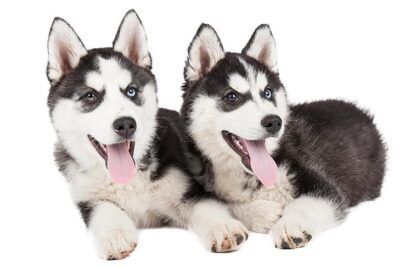Siberian Huskies are a popular breed of dog known for their striking appearance and energetic personality. They are also known for their thick, fluffy coat and amazing blue eyes. But like all dogs, huskies have a period of growth and development. So, when do huskies stop growing?
Generally, huskies reach their full adult size at around 12-18 months. However, it is common for huskies to continue filling out and developing muscle mass until they are two years old.
Male huskies are larger than females and can grow between 45 and 60 pounds as adults. Female huskies are typically more miniature, weighing 35-50 pounds as adults.
However, remember that these are just average sizes, and some huskies may be larger or smaller depending on their genetics. It is also worth noting that overfeeding and lack of exercise can contribute to obesity in huskies, impacting their overall size and health.
While huskies may continue to grow and develop until two years old, they typically reach their full adult size at around 12-18 months. It is crucial to provide your husky with a balanced diet and plenty of exercises to help them reach their full potential and maintain a healthy weight.
When do huskies stop growing?
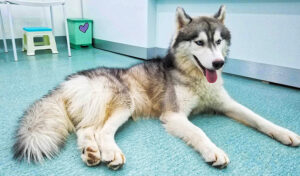
Huskies are a medium-sized breed of dog known for their thick, fluffy coats and striking blue eyes. As with most breeds, huskies undergo rapid growth and development during their first year of life. But when do huskies stop growing?
The short answer is that huskies typically stop growing between 12 and 18 months. However, there is some variation among individual dogs, and some huskies may continue to grow until they are two years old or even older.
During their first year of life, huskies can grow quite rapidly. They may gain as much as 45 pounds in their first 12 months, and their height may increase by as much as 10 inches. After their first year, the rate of growth slows down significantly.
Several factors can influence a husky’s growth rate, including genetics, diet, and overall health. Providing your husky with a high-quality diet that meets their nutritional needs can help them grow at a healthy rate. Regular veterinary care and exercise can also help support healthy growth.
It is crucial to keep in mind that every dog is different, and there is a wide range of normal when it comes to growth and development.
At what age do Huskies reach their full size?
Huskies are a medium-sized breed of dog, and they typically reach their full size between 12 and 18 months. However, it is essential to note that there is some variation among individual dogs, and some huskies may continue to grow until they are two years old or even older.
During their first year of life, huskies can grow quite rapidly. They may gain as much as 45 pounds in their first 12 months, and their height may increase by as much as 10 inches. After their first year, the rate of growth slows down significantly.
Several factors can influence a husky’s growth rate, including genetics, diet, and overall health. Providing your husky with a high-quality diet that meets their nutritional needs can help them grow at a healthy rate. Regular veterinary care and exercise can also help support healthy growth.
How long does it take for a Husky to fully grow?
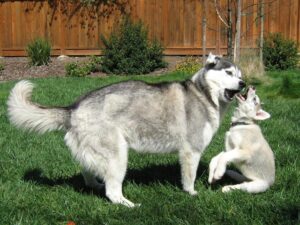
On average, Huskies take about two years to mature fully. However, remember that every dog is different; some may mature more quickly or slowly than others.
During their first year of life, Huskies grow quickly and can gain as much as 40-50 pounds. This rapid growth slows down somewhat during their second year, but they will continue to fill out and gain weight until they reach their full size.
It’s essential to feed your Husky a high-quality diet and regular exercise to ensure they grow healthy. Overfeeding and lack of exercise can lead to problems such as obesity, which can have serious health consequences for your dog.
In addition to physical growth, it’s important to remember that Huskies also undergo several behavioral and emotional changes as they mature. They can be quite rambunctious and energetic as puppies but will generally become calmer and more well-behaved as they grow older.
What factors determine the growth rate of a Husky?
Several factors can influence the growth rate of a husky. These include genetics, diet, and overall health.
Genetics: Genetics play a significant role in determining a husky’s growth rate. Some huskies may be predisposed to grow more quickly or slowly than others based on their genetic makeup.
Diet: A high-quality diet that meets a husky’s nutritional needs can support healthy growth. Providing your husky with an appropriate amount of protein, fat, and other nutrients can help them grow at a healthy rate.
Overall health: A husky’s health can also impact its growth rate. Their growth may be affected if a rough is experiencing health issues, such as an illness or injury. Regular veterinary care and a healthy lifestyle can help support a husky’s overall health and promote healthy growth.
Do all Huskies grow at the same rate?

All huskies do not grow at the same rate. Like humans, dogs are individuals, and there is a wide range of normalcy regarding growth and development. Some huskies may grow more quickly or slowly than others, and there may be variations in their size and weight.
Several factors can influence a husky’s growth rate, including genetics, diet, and overall health. Genetics plays a significant role in determining a rough’s growth rate. Some huskies may be predisposed to grow more quickly or slowly than others based on their genetic makeup.
A high-quality diet that meets a husky’s nutritional needs can also support healthy growth. Providing your husky with an appropriate amount of protein, fat, and other nutrients can help them grow at a healthy rate.
A husky’s overall health can also impact its growth rate. Their growth may be affected if a rough is experiencing health issues, such as an illness or injury. Regular veterinary care and a healthy lifestyle can help support a husky’s overall health and promote healthy growth.
Is it possible to predict the adult size of a Husky puppy?
One way to predict your Husky puppy’s adult size is to look at its parents. Huskies are known for their medium to large size, with males typically weighing between 45 and 60 pounds and females weighing between 35 and 50 pounds. If both of your puppy’s parents are on the larger side, your puppy will likely be on the larger side.
Another way to predict your Husky puppy’s adult size is to look at its breed standards. The American Kennel Club (AKC) breed standards for Huskies state that males should be 21 to 23.5 inches tall at the shoulder, and females should be 20 to 22 inches tall at the shoulder. Remember that these are just guidelines; your puppy may be slightly larger or smaller than the breed standards.
Another factor influencing your Husky puppy’s adult size is its diet and exercise. A well-balanced diet and regular exercise can help your puppy grow to its full potential. However, overfeeding or underfeeding your puppy can affect its growth. It is essential to follow the feeding guidelines your veterinarian or the breeder provides to ensure your puppy gets the right amount of nutrients.
Are there any genetic health conditions that can affect a Husky’s growth?
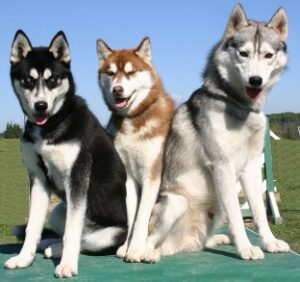
Several genetic health conditions can affect a husky’s growth. These conditions are caused by inherited genetic mutations, which can impact a rough’s health and development.
Hip dysplasia is one genetic health condition affecting a husky’s growth. Hip dysplasia is a condition in which the hip joint is malformed, resulting in pain, lameness, and difficulty moving. Hip dysplasia can be caused by genetics, and environmental factors can also influence it. Huskies with hip dysplasia may have difficulty walking or exhibit an abnormal gait and may also be more prone to arthritis.
Another genetic health condition that can affect a husky’s growth is osteochondrosis dissecans (OCD). OCD is a condition in which the cartilage in a joint does not form correctly, leading to the development of bone fragments. This can cause pain, lameness, and difficulty moving. Huskies with OCD may have a reduced range of motion in their joints and may also be more prone to arthritis.
Several genetic health conditions can affect a husky’s growth, including eye problems, heart conditions, and skin allergies. It is essential to be aware of these conditions and to work with a veterinarian to manage any health issues.
What is the average weight of a full grown Husky?
According to the American Kennel Club (AKC), the standard weight range for a Siberian Husky is 35 to 60 pounds for males and 30 to 50 pounds for females. This means that the average weight of a full-grown male Husky is around 47.5 pounds, while the average weight of a full grown female Husky is about 40 pounds.
It’s worth noting that these are just general guidelines, and individual Huskies may be larger or smaller than the average weight. Genetics, nutrition, and exercise affect a dog‘s size and weight.
Overall, Siberian Huskies are a medium-sized breed that typically weighs between 35 and 60 pounds as adults. It’s essential to monitor your Husky’s weight and make sure they are at a healthy size, as being overweight can lead to a range of health problems.
Providing your Husky with a balanced diet and plenty of exercise can help them maintain a healthy weight and live a long and happy life.
What is the average height of a full grown Husky?

The average height of a full grown Siberian Husky is around 21-23 inches for males and 20-22 inches for females. These heights are measured from the ground to the withers, the highest point of the shoulders.
It is important to note that there is some variation in size within the breed, and some individuals may be taller or shorter than the average. Huskies are known for their athletic build and strong, muscular legs, which contribute to their impressive stature.
The Siberian Husky is a medium-sized breed known for its striking appearance and energetic personality. They are intelligent and loyal companions that are well-suited for a wide variety of activities, including sledding, hiking, and running. With their striking blue eyes and thick, fluffy coat, they are a popular choice for families looking for a playful and affectionate pet.
Do neutered or spayed Huskies grow differently?
Neutering and spaying are surgical procedures that involve the removal of the reproductive organs of a dog. Neutering refers to the removal of the testicles in males, while spaying refers to the removal of the ovaries and uterus in females.
Some evidence suggests that neutering and spaying can affect the growth and development of dogs, particularly large breeds like Huskies. One study found that neutered male dogs were slightly taller and heavier than intact males, while spayed female dogs were somewhat shorter and lighter than intact females.
However, it’s important to note that these differences in growth and development may be due to other factors, such as diet and exercise, rather than neutering or spaying. It’s also worth noting that the effects of neutering and spaying on growth and development may vary depending on the age at which the procedure is performed.
What is the average lifespan of a Husky?
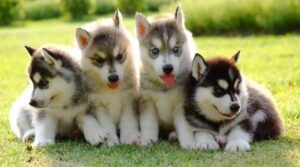
On average, a Husky can live between 12 and 15 years. However, some individual dogs may live longer or shorter depending on various factors.
One of the main factors that can affect a Husky’s lifespan is its overall health. Like any other living being, Huskies are prone to specific health problems that can shorten their lives if not properly managed. For example, hip dysplasia and eye problems are common health issues in Huskies that can lead to long-term disability and shortened lifespan if not treated.
Another factor impacting a Husky’s lifespan is its diet and exercise routine. Proper nutrition and regular exercise are essential for maintaining good health in any dog, and Huskies are no exception. Providing your Husky with a balanced diet and ensuring they get enough physical activity can help them live longer, healthier life.
Finally, genetics can also play a role in a Husky’s lifespan. Some bloodlines are known to be more prone to certain health issues or have longer lifespans in general. It’s always a good idea to do your research and ask about the health history of a Husky’s parents before bringing one home.
How can I ensure my Husky grows at a healthy rate?
Raising a healthy and happy husky requires proper care and attention. Here are a few key things to keep in mind as you watch your husky grow:
Provide a well-balanced diet: It’s essential to feed your husky a high-quality diet appropriate for its age and size. Puppies require more calories and nutrients than adult dogs, so provide a puppy-specific formula. As your husky grows, you may need to adjust its diet to ensure they are getting the proper nutrients.
Practice proper exercise: Huskies are a high-energy breed requiring plenty of exercises to stay healthy and happy. As a puppy, providing your husky with age-appropriate activity is vital to help them grow strong and healthy. This may include daily walks or play sessions and access to a secure, fenced-in yard.
Watch for signs of illness: Keep an eye out for unusual changes in your Husky’s behavior or appearance. If you notice any concerning symptoms, such as vomiting, diarrhea, or lethargy, consult a veterinarian. Early detection and treatment of any health issues can help ensure your husky grows up to be strong and healthy.
Consider spaying or neutering: Spaying or neutering your husky can help prevent certain health problems, as well as help control the pet population. This is typically done when your Husky is around 6-9 months old, but your veterinarian can advise you on the best timing for your pet.
Conclusion
When do huskies stop growing? Siberian Huskies are a medium-sized breed of dog that typically reach their full size by the age of 2 years. However, it is essential to note that individual dogs may continue to fill out and gain muscle mass beyond this age.
Proper nutrition and exercise can help ensure that your husky grows at a healthy rate and reaches their full potential. It is also important to remember that while physical growth is essential to a husky’s development, it is not the only one. Proper socialization and training can help your husky grow into a well-adjusted, well-behaved adult dog.

